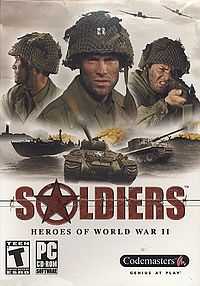Soldiers: Heroes of World War II
| Soldiers: Heroes of World War II | |
|---|---|
 | |
| Developer(s) | Best Way |
| Publisher(s) | Codemasters |
| Engine | GEM |
| Platform(s) | Microsoft Windows |
| Release date(s) | June 30, 2004 |
| Genre(s) | Real-time tactics |
| Mode(s) | Single-player, Multiplayer |
| Distribution | CD, download |
Soldiers: Heroes of World War II is the first in a series of real-time tactics video games set in World War II, developed by or under the supervision of Ukrainian company Best Way.
While the most widely distributed edition by Codemasters bears the name Soldiers: Heroes of World War II, its original English language title is Outfront.
The player can take control of American, British, Soviet, or German forces to play out battles that are set in World War II. The game is primarily a strategy game, but the player can take control of his or her forces and direct them with the keyboard and mouse for additional depth of control.
Game scenario writers include Alexander Zorich.
Gameplay
In the single player missions, players are generally allotted a very small amount of soldiers, and losing just one soldier can be a huge loss. Thus, the game is about conserving your soldiers and keeping them safe for most of the time. The game simulates close combat military tactics, allowing the player to place their soldiers behind cover and move them around all at once, yet also allowing the player to take control of their soldiers to make them do more advanced commands.
There are many types of vehicles, ranging from tanks to anti-aircraft vehicles to simple jeeps. Any soldier could drive or man any position in a gun, which, albeit unrealistic, allowed for many interesting gameplay implications.
Further, soldiers have inventories, which allow for the implementation of an ammunition system, as well as for soldiers to loot better or simply different weapons and grenades from dead enemies, as well as dead friendlies. Even vehicles have ammunition, which players can scavenge from disabled (though not destroyed) vehicles.
Another interesting side effect to using vehicles under direct control is that this allows the user to aim at specific points on enemy vehicles. A player can aim for an enemy tanks treads for example, which would prevent it from moving, but still allowed it to fire. Thus, by doing this, a player can stop a tank from harassing him, while creating a "dead zone" that he can't move in without getting attacked.
Aside from realistic location damage on vehicles, the game offers a virtually completely destructible environment. This is especially taken advantage of when using a vehicle in direct control, in which a player can aim the turret and literally blow buildings apart.
Originally, the only way a player could play this game multiplayer was to play a cooperative game mode which took up to four players through any mission from the single player mode. The soldiers in each map were divided between the players, but otherwise this mode was exactly the same as single player. However, there was no server browser, and players were forced to directly connect by IP Address to play.
In a more recent patch, players are able to play different multiplayer modes, including escort missions and king of the hill type scenarios. No in-game server browser was created, but a player could use GameSpy Arcade as a server browser.
Spin-offs
Outfront: Saboteurs (В тылу врага: Диверсанты) was released by 1C in 2005. Development was outsourced to studio Dark Fox, using Best Way's Heroes engine. Paradox Interactive acquired international rights from 1C in 2006 and renamed it Silent Heroes: Elite Troops of World War II, axing the original version's multiplayer in the process.
Outfront: Saboteurs 2 (В тылу врага: Диверсанты 2), developed by Dark Fox, followed in 2006. This product is unreleased outside of Eastern Europe.
Outfront: Saboteurs 3 (В тылу врага: Диверсанты 3), developed by Realore Studios, followed in 2008. This product is unreleased outside of Eastern Europe.
Sequels
The first fully fledged sequel, Faces of War, appeared in 2006. Its intended international title was Outfront II, but that moniker was scrapped after a distribution deal was struck with Ubisoft. Rechristened Faces of War, the game was released on September 12, 2006.
The next installment in the series was a joint development between Best Way and German partners Digitalmindsoft. Russian publisher 1C marketed it as a two-part standalone expansion for Faces of War.
External links
| ||||||||||